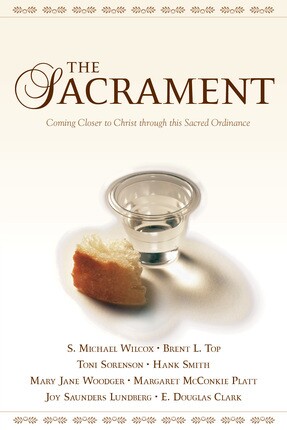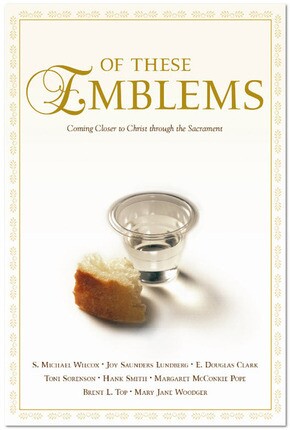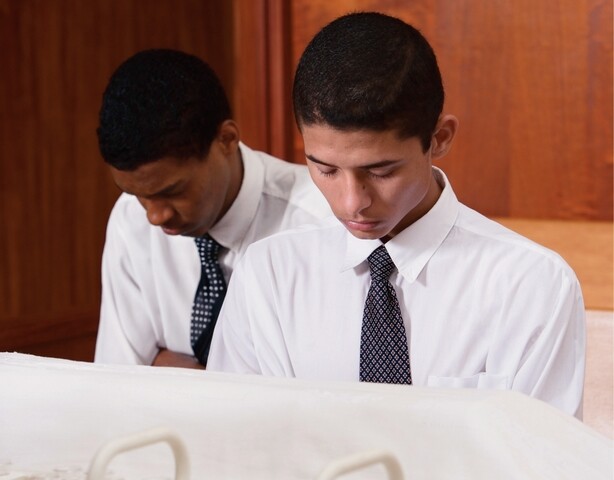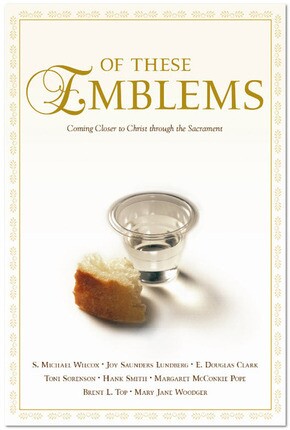Often our experiences during the sacrament service seem quite ordinary. However, partaking of the sacrament is one of the most important and sacred ordinances in which we can participate. Here are four ways we can get more from the sacrament and "always remember him and keep his commandments. . . that [we] may always have his spirit to be with [us]" (D&C 20:77-79).
1. Remember
In the [sacrament] prayer we are coaxed—no, commanded—to remember. Remember. As our minds soar across the millennia, we find there is so much to remember about Him that we in turn should exemplify ourselves. We remember His love for all—not just the attractive or powerful or wealthy or righteous. We remember His desire to do the Father’s will always—not just when it was convenient or easy. We remember the battle against evil that He waged in Gethsemane and that He fought until He won—no matter the cost. And we remember His complete devotion to righteousness. We remember, and we offer our own hearts, trusting Him to be with us every step of the way.
As we wait reverently, the emblems are passed to each one there assembled. Everyone has the opportunity to partake, for in the Lord’s kingdom, not a single one is overlooked. Each is invited. Through some infinite eternal arithmetic that our mere mortal minds cannot grasp, the power of the Savior’s Atonement reaches out to touch us in a unique way, carried tenderly by deacons—the smallest and weakest, for those moments each Sunday made strong enough to help deliver salvation.
In our partaking, we remember Him, and we anxiously hope to become acceptable. In our weekly taking of the emblems of His flesh and blood, we are helped in that quest, becoming clean once again. And we do remember Him. For Him, the cup was bitter—the most anguished any has ever been asked to sip. Had it been up to Him, and Him alone—had not innumerable souls hung in the balance, had not He stood unwavering in that great and crowning council—perhaps He would have turned from that bitter cup with its horrific dregs. But it was not up to Him alone, because His very life—His will, His purpose, all that He was—reflected in perfect oneness the will of the Father whose Son He was. And so, exercising every fiber of His remarkable strength and courage, He drank of that bitter cup so that we would not have to. Instead, the cup from which we drink each week is clean and pure—quenching manna to our hungry spirits, yearning to be fed by all that He is.
When the cool, clear water touches our lips, we might remember that His experience was far different. Exhausted, bruised, His flesh torn, He hung in agony and must have trembled with a thirst unlike any we could know. No relief came—only a sponge soaked in acrid vinegar was pressed to His parched lips—until He gave up the ghost and declared, “It is finished” (John 19:30).
2. Understand the Symbolism of the Sacrament (S. Michael Wilcox)
I used to wonder why the sacrament involved two symbols— wouldn’t one be sufficient to remind us of the Savior’s gift? It took a number of years before I realized there was wonderful symbolism in the use of both bread and water, and that the associated symbolism had a deeper meaning than the Savior’s body and blood.
As a result of the Fall, two deaths entered the world— spiritual and physical. Because man is subject to spiritual death, we are cut off from the presence of the Father; because of physical death, our spirits leave our mortal bodies when our time in mortality is finished. Both are in a certain manner catastrophic. Our spirits long for eternal union with God as well as eternal union with our physical bodies. That these unions may be everlasting, Christ came into the world. Each symbol of the sacrament reminds us of Jesus’ victory over both deaths—the bread a reminder of His victory over physical death, the water a reminder of His victory over spiritual death.
Doctrine and Covenants 27 helps us see the distinction between the two symbols. While on his way to procure the emblems of the sacrament, Joseph Smith received the revelation recorded in Section 27 that gives instruction regarding the sacrament. Notice what the Lord says: “I say unto you, that it mattereth not what ye shall eat or what ye shall drink when ye partake of the sacrament, if it so be that ye do it with an eye single to my glory—remembering unto the Father my body which was laid down for you, and my blood which was shed for the remission of your sins” (D&C 27:2, emphasis added).
The last part of this verse indicates the two main things Christ did for us that we are to remember. Jesus laid down His body that He might take it up again and thus bring to us all the gift of the Resurrection. He also shed His blood that we might receive a remission of our sins through the compassion and mercy of the Atonement.
We sense this same distinction when the Savior taught the Nephites and Lamanites at the temple in Bountiful. There was one emblem for the Resurrection and one for the Atonement. When teaching about the bread, the Savior told the people they were to administer the bread “unto all those who shall believe and be baptized in my name. . . . And this shall ye do in remembrance of my body, which I have shown unto you” (3 Nephi 18:5,7 emphasis added).
3. Express Gratitude (Joy Saunders Lundberg)
Sometimes a sacrament meeting speaker will say something that lingers in your mind for years to come. That happened to me when a speaker was giving a talk about the importance of the sacrament. He told about a man who came into a meeting and sat on the pew beside him; he didn’t recognize the man and found out later he was not a member of the Church. The man was attentive and reverent. When the sacrament bread was passed the man took a piece and said in a barely audible voice, “Thank you, Jesus.” When the water was passed, he drank and again said, “Thank you, Jesus.” The speaker told how touched he was by this man’s gratitude to the Savior for what He had done for him.
Now whenever I partake of the sacrament I often find myself thinking the words, “Thank you, Jesus.” Expressing gratitude in our hearts for what the Savior has done for us is significantly important; however, that is just one part of the sacrament experience for Latter-day Saints.
Elder Joseph Anderson explained,
“When we enter into the waters of baptism we enter into covenant with the Lord that we will keep the commandments that He has given us. When we partake of the sacrament we renew that covenant; we partake of these emblems in remembrance of the atoning sacrifice of our Lord and Savior; we express a willingness to take upon us His name, the name of our Lord and Master, our Savior, Jesus Christ; and we covenant that we will always remember Him, that we will keep the commandments which He has given us” (“We Are a Covenant-making People,” Ensign, Nov. 1976, 89).
In speaking about the sacrament, Elder Jeffrey R. Holland reminded us that we as a people need to take the sacrament much more seriously than we often do—and that the sacrament is the real purpose of sacrament meeting, not something to rush through so we can get on with the rest of the meeting. He also counseled that everything in the meeting, all that is spoken or sung, should be in harmony with that sacred ordinance (see “‘This Do in Remembrance of Me,’” Ensign, November 1995, 67).
By our consistent attendance and partaking of the sacrament, the Lord will use the way He has provided to heal our hearts and bring peace to our souls. We need to be where He is—where He has commanded us to be each Sunday, participating in “the grandeur of this sacred ordinance.” As we do this, it may be said of us, like the Nephites of old during that first administration of the sacrament, “[they did eat and] . . . they did drink, and they were filled” (3 Nephi 18:9).
4. Remember Him, Not Past Sins (Hank Smith)
I don’t know about you, but I really hate sin. I hate how sinning makes me feel inside. Occasionally, someone will comment to me, “I wish I could be baptized again. It would be nice to feel that clean again.” If you have ever felt that way, mark these lines in your own copy of True to the Faith: “You receive great blessings when you keep the baptismal covenant. As you renew it, the Lord renews the promised remission of your sins” (p.148).
Isn’t that wonderful! The Lord has provided the sacrament so you can feel that clean again each and every week if you keep your baptismal covenant. In my personal study of the baptismal covenant, I’ve noticed that the Savior places a great deal of emphasis on our promise to remember Him. I’m not sure if you’ve noticed, but of the three covenants we renew as part of the sacrament prayer on the bread, only one is carried over to the sacrament prayer on the water—“that they do always remember Him.”
When the Savior first instituted the sacrament in Jerusalem just before His death, Luke records: “And he took bread, and gave thanks, and brake it, and gave unto them, saying, This is my body which is given for you: this do in remembrance of me” (Luke 22:19). And when He first instituted the sacrament among the Nephites, the Savior said: “And this shall ye always observe to do, even as I have done, even as I have broken bread and blessed it and given it unto you. And this shall ye do in remembrance of my body, which I have shown unto you. And it shall be a testimony unto the Father that ye do always remember me” (3 Nephi 18:6–7).
Why is remembering the Savior so critical to our sacrament experience? I personally feel that the Savior is not only telling us what to remember, but what not to remember. When we have the cleansing experience of the sacrament and the Lord renews the promised remission of our sins, we seem to have a natural tendency to sabotage the experience by needlessly remembering all of our past sins.
When the Savior directs us to always remember Him, He is also directing us to not always remember our past sins. Dwelling on our previous mistakes or the mistakes of others is depressing and discouraging. Think back to the example of Isaiah. Notice that Isaiah doesn’t continue to tell us about his “unclean lips” after his sacrament experience. The cleansing power of forgiveness has closed and sealed the door on his past sins. He doesn’t bring them back up, and neither should we. The Anti-Nephi-Lehies didn’t spend any time digging up the weapons they had buried. The Lord clearly states, “I, the Lord, will forgive whom I will forgive, but of you it is required to forgive all men” (D&C 64:10). Part of the requirement to forgive all men is to forgive yourself.
Lead image from LDS.org
For more tips on how to make your sacrament experience more meaningful, pick up your copy of The Sacrament: Coming Closer to Christ through this Sacred Ordinance at a Deseret Book store near you or online at deseretbook.com.




